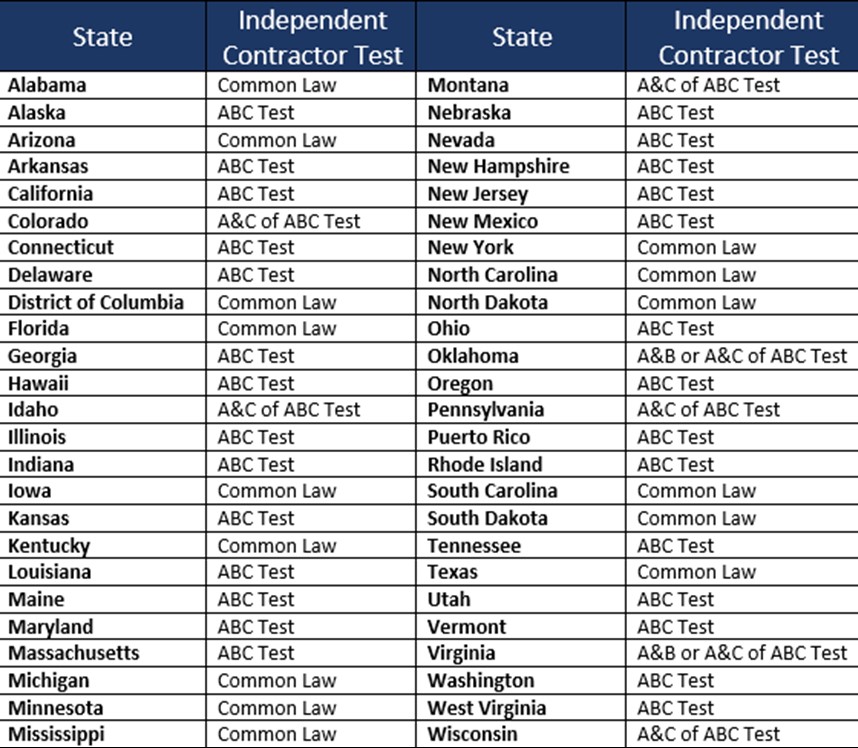The battle and confusion of identifying an independent contractor continues. Jumping across party lines for rules established to benefit employers under the Republican Trump Administration to now halting the advancement of those rules in an effort to benefit employees under the Democratic Biden Administration.
Such as with any new political administration, the incumbent traditionally pend new rules “for the purpose of reviewing any questions of fact, law, and policy the rules may raise.” On January 20, 2021, a memorandum, “Regulatory Freeze Pending Review” was issued by the Biden Administration that proposed delaying rules published in the Federal Register for 60 days as well as the option to re- open for a comments review period from interested parties.
For rules impacting independent contractors, the Department of Labor (DOL) announced on February 3 that it would pend the effective date of the Independent Contractor Status Under the Fair Labor Standards Act (Independent Contractor Rule) from March 8, 2021 to May 7, 2021. Additionally, the DOL withdrew two opinion letters that addressed independent contractors as the opinions were issued based on rules not yet in effect:
- FLSA-2021-8 regarding independent contractor status for certain distributors of manufacturers food products.
- FLSA-2021-9 for guidance on control of safety measures for tractor-trailer truck drivers as to whether this affects their independent status and if certain owner-operators are properly classified as independent contractors.
Employers are cautioned that they should not be relying on either the Independent Contractor Rule or the opinions published in these rescinded opinion letters. What does all this posturing between the political parties mean for employers? For purposes of the Independent Contractor Rule, there are three options to choose from:
- The rule could take affect even if temporarily;
- The rule could be challenged in court by an outside party; or
- The rule-making process could be re-opened, and comments accepted.
This third option is what was chosen. The comment period was open until February 24, 2021.
At the heart of the matter for Democrats is workers’ rights for affordable healthcare, fair compensation, safety and health benefits, and other workplace protections along with the right to unionize.
There is no federal standard for defining an independent contractor and many employers have relied upon either:
- The Common Law test, used by the Internal Revenue Service, which looks to identify who holds the direction and control of the worker (either the worker or the employer).
- The ABC test (used by the DOL) which also looks at the direction and control plus evaluates if the worker engages in a trade, business or occupation similar to what they are doing for an establishment.

Additionally, the following states/cities have passed their own legislation to establish a test for independent contractors, define who is an independent contractor, add protections for independent contractors, define an employee, and/or impose penalties for misclassification:
- California’s AB5 legislation effective January 1, 2020, and Proposition 22
- Iowa SB 2296 effective July 1, 2021
- Louisiana Employment Security Law effective Jan 1, 2021
- Minneapolis – Freelance Worker Protection Ordinance effective January 1, 2021
Virginia – HB1407 effective January 1, 2021
Currently the DOL and the states impose penalties for misclassification of employees as independent contractors. The Biden Administration labor platform is based on “strengthening worker organizing, collective bargaining, and unions.” It is anticipated that we will continue to see a focus on audits and an increase in enforcement penalties for misclassification of employees as independent contractors, as we did during the Obama Administration.
With a position to “aggressively pursue employers who violate labor laws, participate in wage theft, or cheat on their taxes by intentionally misclassifying employees as independent contractors,” employers should revisit their independent contractor arrangements and take measures to ensure that workers are properly classified.